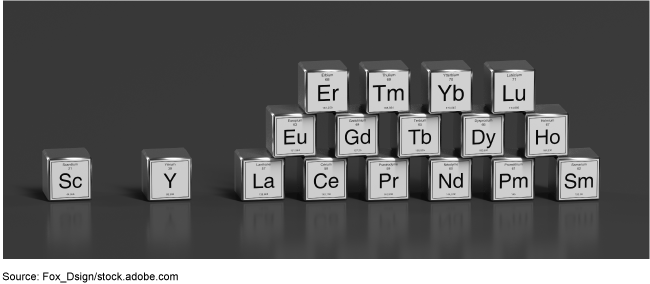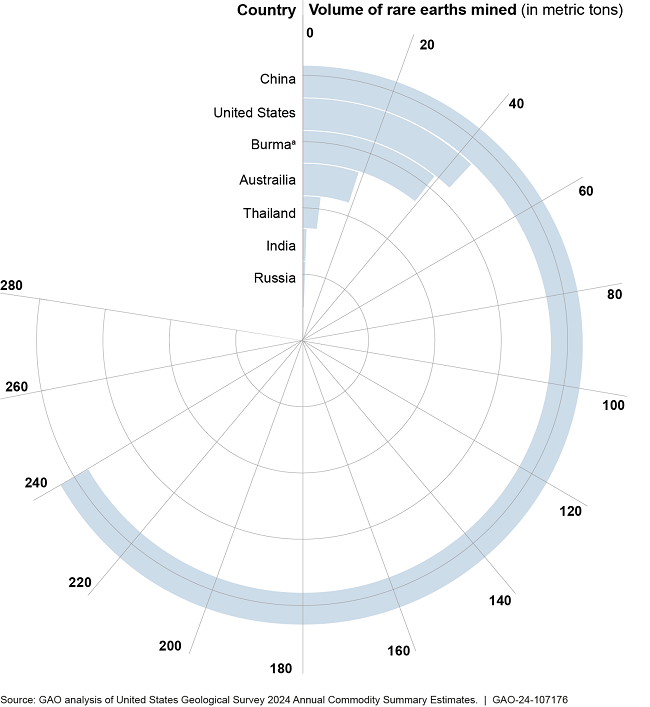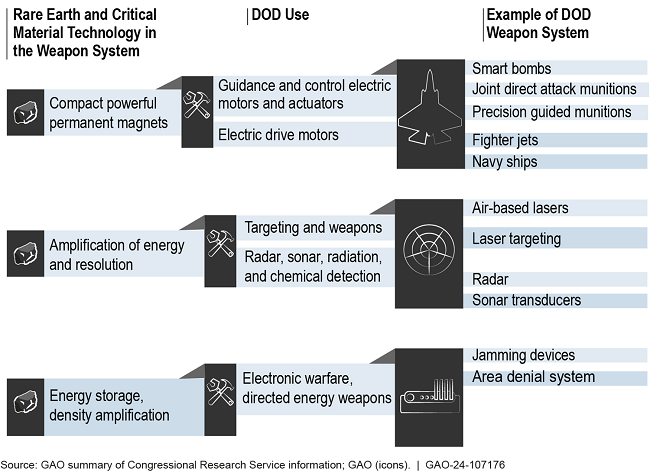Critical Materials: Action Needed to Implement Requirements That Reduce Supply Chain Risks
Fast Facts
Critical materials are elements, metals, and more that aren't available in sufficient quantities from U.S. sources but are essential building blocks for weapon systems. DOD manages the National Defense Stockpile, which includes a reserve of these materials.
A 2019 law prohibited sales from the stockpile to certain adversary nations—unless sales are in the national interest.
In this Q&A, we reported that DOD hasn't fully implemented the law. It doesn't have a way to determine whether buyers are working for these nations, or to determine whether the sales are in the national interest.
We recommended fully implementing the law.
Rare Earth Elements Are a Category of Critical Materials

Highlights
What GAO Found
Critical materials—like rare earths, tantalum, and tungsten—are materials needed to supply U.S. military, industry, and essential civilian needs during a national emergency and are not found or produced in sufficient quantities in the U.S. These critical materials enable high-performance combat capabilities in weapon systems. The Department of Defense (DOD) has assessed there would be a high potential for harm to national security in the event of a supply chain disruption. Most of these materials are mined and processed in China, which makes DOD's weapon system programs vulnerable to supply chain disruptions by an adversary nation.
Top Countries Involved in the Mining of Rare Earth Elements, 2023

Note: Countries that mined less than 1,000 metric tons are not included in the figure.
aThe U.S. Department of State officially recognizes the country of Burma, rather than Myanmar.
- According to the U.S. Geological Survey, the U.S. imported more than 95 percent of the rare earths that it consumed. From 2019 through 2022, almost three-quarters of these imports came from China.
- Rare earths and other critical materials, like tantalum and tungsten, lack equivalent substitutes that perform at the same level.
- DOD uses large quantities of rare earths and other critical materials in its weapon systems but has limited influence on the markets for these materials. DOD estimates that its total demand for rare earths is less than 0.1 percent of global demand.
Notional Uses of Rare Earths and Other Critical Materials in Department of Defense (DOD) Weapon Systems

Congress included procurement requirements in recent National Defense Authorization Acts that could reduce DOD's reliance on adversary nations for rare earths and other critical materials. For example, one requirement restricts DOD's procurement of certain goods containing rare earths and other critical materials from certain Chinese sources. DOD has ongoing rulemaking efforts to implement these statutory requirements, with full implementation expected in a few years.
As GAO reported in July 2024, there are additional policy options the U.S. government could consider to recover critical minerals, such as rare earths, from nontraditional sources to help reduce the U.S.'s dependence on foreign sources (GAO-24-106395).
DOD is also taking steps to encourage the expansion of critical material mining, processing, and production in the U.S. For example:
- Since 2020, DOD has awarded approximately $439 million to vendors to reestablish domestic rare earth supply chains.
- DOD manages the National Defense Stockpile of strategic and critical materials, which can be used during times of national emergency.
GAO found that DOD has not taken steps to implement a restriction on selling material from the National Defense Stockpile to adversary nations. Federal law prohibits DOD from selling any material from the stockpile to China, Iran, North Korea, and Russia, or to any third party reasonably believed to be acting on their behalf, if such a sale is not in the national interest.
DOD officials who work on stockpile policy issues were not in their positions when this requirement went into effect in 2019 and could not identify with certainty why DOD has been delayed in implementing the sales restriction. They said that they recognize the need to implement the stockpile sales restriction and that they have started to discuss how to do so.
DOD officials said that there was limited risk DOD would sell stockpile materials of national interest to adversary nations or entities acting on their behalf. GAO found, however, that DOD currently has limited insight into a buyer’s affiliation with an adversary nation. Under existing procedures, officials stated that they rely on buyer self-attestation for the company’s location and the end use for the material being sold. GAO previously reported on the risks of relying on companies to self-certify their information without verifying key information. Until DOD takes steps to implement the statutory requirement governing the sale of materials from the National Defense Stockpile, it will continue to have limited insight into whether it is selling stockpile material to adversary nations. DOD will also continue missing opportunities to manage potential risks associated with these sales.
Why GAO Did This Study
The James M. Inhofe National Defense Authorization Act for Fiscal Year 2023 included requirements for GAO to assess specific DOD efforts related to rare earths, critical materials, and the National Defense Stockpile. This report describes DOD's efforts to implement certain statutory procurement requirements for rare earths and critical materials. It also assesses DOD's efforts to ensure that material from the National Defense Stockpile is not sold to certain adversary nations.
GAO interviewed DOD officials and reviewed relevant legislation; DOD rulemaking efforts; and DOD reports, policies, and guidance. GAO also analyzed data on National Defense Stockpile sales.
Recommendations
GAO is recommending that DOD takes steps to implement the requirement to prevent National Defense Stockpile sales to certain adversary nations or third parties acting on their behalf when these sales are not in the national interest, including steps to consider buyers’ affiliations with adversary nations. DOD concurred with the recommendation.
Recommendations for Executive Action
| Agency Affected | Recommendation | Status |
|---|---|---|
| Department of Defense | The Secretary of Defense should ensure that the Under Secretary of Defense for Acquisition and Sustainment, as the Stockpile Manager, takes steps to implement the requirement to prevent sales of material from the National Defense Stockpile to China, Iran, North Korea, and Russia or third-party entities acting on their behalf when such sales are not in the national interest of the United States, including steps to consider buyers' affiliations with these nations. (Recommendation 1) |
When we confirm what actions the agency has taken in response to this recommendation, we will provide updated information.
|
